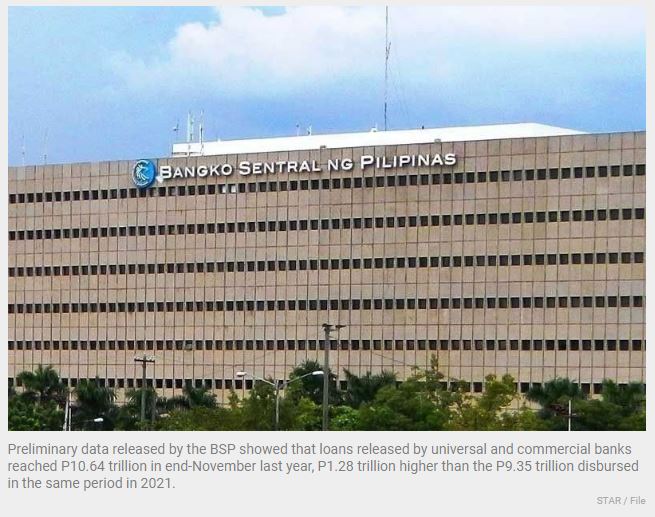Philippines: Bank lending slows as rate hikes bite
MANILA, Philippines — The series of aggressive rate hikes delivered by the Bangko Sentral ng Pilipinas (BSP) has started eating into credit growth, as the increase in loans disbursed by big banks slowed to 13.7 percent in November from 13.9 percent in October.
Preliminary data released by the BSP showed that loans released by universal and commercial banks reached P10.64 trillion in end-November last year, P1.28 trillion higher than the P9.35 trillion disbursed in the same period in 2021.
Despite the slowdown, the BSP remains confident that credit growth would support continued recovery from the impact of the COVID-19 pandemic.
“Sustained growth in credit and domestic liquidity will continue to support economic activity and domestic demand. Looking ahead, the BSP will ensure that liquidity and lending dynamics remain consistent with its primary mandate of promoting price and financial stability,” BSP Governor Felipe Medalla said.
Prior to the slowdown in November, credit growth had accelerated for 15 consecutive months or since August 2021 after contracting for eight straight months between December 2020 and July 2021 due to the impact of the pandemic.
To tame inflation and stabilize the peso, the BSP raised key policy rates by 350 basis points last year, wiping out the 200-basis-point cumulative cuts implemented in 2020 as part of its COVID response measures.
This brought the benchmark interest rate to a 14-year high of 5.50 percent from an all-time low of two percent, as inflation quickened to a 14-year high of eight percent in November from 7.7 percent in October.
Michael Ricafort, chief economist at Rizal Commercial Banking Corp., said that credit growth was still among the fastest in four years despite the slowdown in November
The easing, Ricafort explained, was partly due to soaring inflation, as well as rising trend in global and local interest rates amid the hawkish US Federal Reserve.
“That led to higher borrowing costs for consumers, businesses, and other institutions that, in turn, partly weighed or dragged demand for loans or credit,” Ricafort said.
The chief economist from the Yuchengco-led bank said demand for bank loans would still be fundamentally supported in the coming months as the economy already reopening further toward greater normalcy that makes companies and conglomerates more decisive on new investments and expansion plans that require various fund raising activities.
“Possible easing of inflation for the coming months would also help fundamentally ease interest rates/borrowing costs/financing costs, thereby would also help spur loan demand,” he said.
Inflation averaged 5.6 percent from January to November and is expected to pick up further in December due to Christmas spending, well above the BSP’s two to four percent target range.
It is expected to remain elevated in the first half before easing back to within the government’s target range by the second half of 2023.
On the other hand, the country’s gross domestic product grew by 7.7 percent between January and September last year, exceeding the 6.5 to 7.5 percent GDP target penned by economic managers.
Data showed the increase in loans to production activities was steady at 12.5 percent to P9.3 trillion in November last year from P8.28 trillion in the same month in 2021 and accounted 87.4 percent of the total disbursements.
The real estate sector grew at a slower rate of 12.2 percent to P2.08 trillion and accounted for 19.6 percent of the total disbursements followed by the manufacturing sector with a slower 15.6 percent growth to P1.22 trillion for a share of 11.5 percent as well as wholesale and retail trade, repair of motor vehicles and motorcycles with a 9.3 percent increase to P1.21 trillion for a share of 11.4 percent.
Likewise, loans extended to the electricity, gas, steam and air-conditioning supply sector climbed by 10 percent to P1.13 trillion for a 10.6 percent share, while credit extended to financial and insurance activities grew by a faster rate of 13.1 percent to P1.05 trillion for a 9.9 percent share.
Despite higher interest rates, growth in lending to households picked up to 24.1 percent, as P1.01 trillion in end-November for a 9.5 percent of the total loans disbursed by big banks.
Credit card loans surged by 26.5 percent to P539.25 billion from P426.22 billion as the BSP decided to maintain a status quo on the cap on credit card charges at two percent per month or 24 percent per annum until the end of 2022.
Auto loans also inched up by 8.7 percent to P325.89 billion from P299.77 billion, while salary-based general-purpose consumption loans soared by 67.2 percent to P124.04 billion from P74.2 billion.
The BSP also reported a 5.4-percent rise in money supply or liquidity in the financial system to P15.6 trillion in end November.
Source: https://www.philstar.com/business/2023/01/05/2235337/bank-lending-slows-rate-hikes-bite


 Thailand
Thailand




